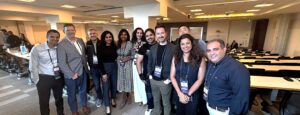A frequent winner of teaching awards, Prof. Gad Allon is known to Wharton EMBA students in Philadelphia and San Francisco for his courses on Scaling Operations and Operations Strategy. He also is leading a new virtual Global Modular Course on supply chain issues in China. “I enjoy teaching EMBA students because they are dealing with the issues we talk about in class in real time, so the discussion is richer, deeper, and more informed,” he said. We asked him to tell us more about his EMBA courses and research areas. Here is what he said:
What classes are you currently teaching in the EMBA program?
“I teach a first-year course called Operations Strategy. The focus is on how to make strategic decisions that have a long-term impact while understanding the operational implications of these decisions. How do you balance the need to execute in the short run while also building capabilities in the long run? I taught that course in San Francisco last year, and I am teaching it in Philadelphia this year.
I also teach an elective called Scaling Operations for students on both coasts. We look at the main challenges that firms face and how those challenges change as they grow. What brought you to where you are is most likely going to be the obstacle for the next phase. We also focus on developing frameworks to assess your readiness to scale.”
What do you like about teaching on the San Francisco campus?
“A lot of what I do involves technology, and most of the cases in the course are around technology. Many students on the West Coast in this course have experience with or are currently working in the tech industry. That generates an informed discussion on current trends and the evolution of the theories we discuss in class.”
How is virtual teaching going during the pandemic?
“I have invested heavily in setting up a virtual classroom in my home. I hired a sound engineer to help optimize the sound, I have a high-quality camera, and I have a large screen so that I can see everyone in front of me during class. A surprising benefit of teaching virtually is that I can engage more students in the discussion with the chat feature. I will ask the entire class a question to answer via the chat and can see everyone’s answers. Overall, you can potentially get a richer discussion by seeing everyone’s perspectives. I will miss that ability a little bit when we return to the classroom.”
What is the focus of your Global Modular Course in China?
“I’m teaching a virtual course on contemporary topics on the supply chain in China. We cannot visit companies in person, but we have very high-quality speakers virtually. The supply chain in China is moving fast, and we are seeing innovations there that are outpacing innovations in the U.S. A good example is the mobile payments space. Everything in China in that space was built from scratch, so they are building platforms that allow other firms to manage logistics and it is extremely automated.”
Why are Global Modular Courses valuable for EMBA students?
“There are innovations happening in other parts of the world that are hard to appreciate unless you speak with people there. You can read about them all day, but you have to immerse yourself in the topic to really understand what is happening. For example, e-sports and e-gaming are more advanced in China than in the U.S. As the saying goes, ‘The future is already here, but it is not evenly distributed.’ We can look to China to see the future.”
How do you engage with EMBA students outside of the classroom?
“A big part of teaching on the San Francisco campus is the immersive experience. When I am teaching in San Francisco, I have meals with the students. I also invite students to join me for 6:00am runs on Saturday mornings along the Embarcadero. They are like moving office hours because we discuss course-related and unrelated topics while running.
I also enjoy working with EMBA students on both coasts on independent projects. Some students use these projects to apply learnings to develop their business ideas. Other students focus on developing frameworks beyond the course. For example, a recent group of students focused on understanding how founders and managers change their communication structure as they grow.”
What research projects are you currently working on?
“I have two main projects. One involves trying to better understand global networks and supply chain networks, especially now with political changes. Second, I am studying the gig economy to understand how workers in that industry are making decisions about where to go and which firms to work for. Many workers are ‘multihoming,’ which means they work simultaneously for multiple firms. How do they make those decisions?”
— By Meghan Laska
Posted: May 31, 2021




















